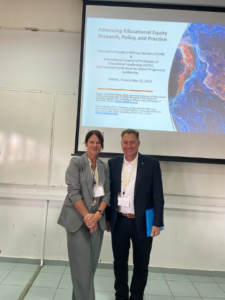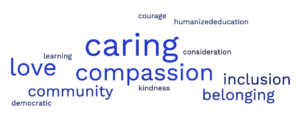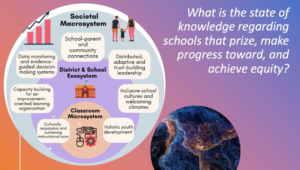Global Progressive Leadership for Equity: Athens, Greece Conference Take-aways
By Kristen Campbell Wilcox
What do progressive educational leaders need to know about addressing educational equity challenges from colleagues around the globe?

This was a central question guiding my thinking as I represented NYKids at the Educational Leaders Without Borders (ELWB) & International Council of Professors of Educational Leadership (ICPEL) International Conference on Global Progressive Leadership in Athens, Greece May 29th-31st. This event was hosted by, and located at, the University of West Attica.
At the conference I shared a paper coauthored with colleague, and NYKids contributor, Hal A. Lawson (O’Leary Professor Educational Policy and Leadership and School of Social Welfare) entitled: Advancing Educational Equity Research, Policy, and Practice. This paper, highlighted in a previous NYKids blog, discusses the transition away from equality-focused schools and toward new equity-centered school designs. The paper and conference presentation discuss lessons learned about addressing inequities in education from nearly two decades of NYKids’ positive outlier school research.
In this session, I invited conference participants to share their responses to a central question we explored in our paper and presentation:
What is a quality of schools that prize, make progress toward, and achieve equity?
The word cloud below represents responses from colleagues from Malaysia, Nigeria, Greece, the United States, South Africa, Syria, Kenya, and the United Kingdom.

Themes on Global Progressive Leadership
“Educating the mind without educating the heart is no education at all.” ― Aristotle
A few of the central themes discussed at this conference, and represented in the word cloud above, included:
Educational Continuity and Rigor:
In light of increasing migration flows in some regions of the world and increasing incidence of youth experiencing trauma and social-emotional learning delays due to economic, political, or social crisis and pandemic- and climate-change-related disruptions, questions are raised as to how educational leaders can foster adaptable systems to meet students’ needs. One presenter, Yahya Al-Abdullah, shared his ethnographic work exploring Syrian ethnic minority youth experiences with “step migration.” He spoke to the complex and dynamic policy and leadership challenges raised as youth experience extended periods of interrupted formal education.
Voice and Power:
Concerns for elevating the voices of those most vulnerable and/or marginalized in interrogating systems that propagate inequities in education was another prevalent theme in conference talks. This was related to the call for “humanizing” education and in some presenters’ papers connected to the United Nations Sustainable Development Goals. As just one example, Zurina Abd Ghani, from Malaysia, shared her paper “Humanizing Leadership through Humanizing Education in Higher Education Institutions.” In this paper she discussed qualities of “values-based leadership,” which resonates with NYKids’ recent research findings such as:
- Understanding cultural differences
- Emphasizing values
- Building relationships
- Empathy and compassion
- Lifelong learning
Holistic Development and Innovative School Designs:
Another, and related, theme of several sessions related to how educational leaders must address an international challenge. While we must maintain a focus on near-term academic outcomes, there is an accompanying need to shift toward a longer-term and more holistic view of learner development. For example, “pre-school safety nets for children” are essential, as speaker Peter Ndiang’ui from Florida Gulf Coast University asserted. Furthermore, this leadership imperative includes the balancing of  academic focused work with moral and ethical learning. It also extends to how physical and mental health needs of learners and families are prioritized in new school designs. As one example, Doukas Psomadelis, shared his study on the “degree of satisfaction regarding the results of public-private partnerships (PPPs) in Greek Education.” He described the challenges and benefits of engaging partnerships in developing and implementing innovative school designs.
academic focused work with moral and ethical learning. It also extends to how physical and mental health needs of learners and families are prioritized in new school designs. As one example, Doukas Psomadelis, shared his study on the “degree of satisfaction regarding the results of public-private partnerships (PPPs) in Greek Education.” He described the challenges and benefits of engaging partnerships in developing and implementing innovative school designs.
I was honored to attend this conference. I return home inspired by the equity-oriented commitments, innovations, achievements, and lessons learned offered by educational leaders from around the world. While, from a global perspective, New York is an exemplar for providing a broad range of diverse learners access to public education, this international conference offered a powerful reminder of the hills we have left to climb in addressing persistent, educational equity, and opportunity gaps.
As NYKids enters into the summer of 2023, we look forward to bringing local learning and global perspectives to fulfill our mission to “inform, inspire, and improve.” We also harken back to Aristotle’s wise guidance – namely, to approach education with heart.
Thank you for your interest in NYKids. You may visit our webpage for the latest research and news, and follow us on Twitter, Instagram, or Facebook, for announcements.
